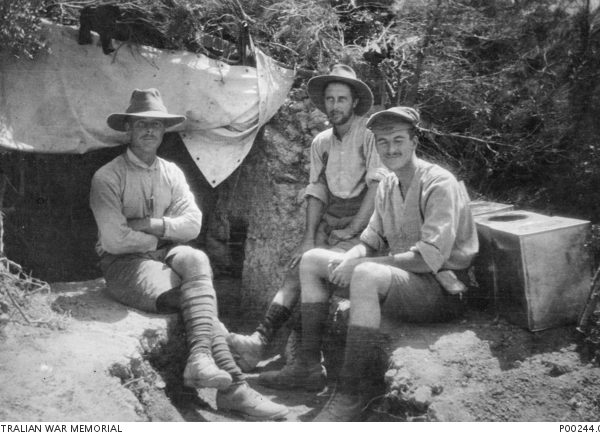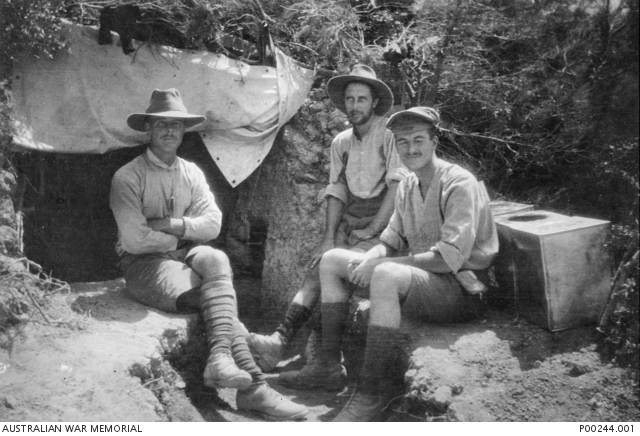

Three Australian officers at Gallipoli, identified from left to right: Lieutenant Roy Kernot of the 1st Division Engineers; Lieutenant Edward Stanley Whitehead of the 3rd Field Company Engineers and Lieutenant Louis Willyama Avery (later MM) of the 1st Division Engineers. The three friends were all associated with the Silverton Tramway Company in Broken Hill and survived the war.
Avery, Louis Willyama – September 1917
Sept 3rd.
I was ordered to report at Orderly room at 9.30 a.m. in full marching order…We were to proceed to a Heavy Bridging School at Aire-sur-Lys…Most of the men are N.C.O’s & all Dinkum Anzacs…Our billets are barges on the canal. They are nicely fitted up with bunks & tables. It is a great change to get away from our recent monotonous life of parades & other frightfulness… Aire is a fairly large place & is full of Portuguese troops. They are a miserable lousy looking type, an look utterly incapable of standing up to Fritz. He would eat them whole.
Sept 4th.
…Another air raid tonight, the bombs falling very close. The old barge rocked & vibrated a treat. Evidently the bombs did not have our identity disc numbers on them. Who cares! If they hit us we will not know what it was. The dogs might find a few odd scraps of meat lying about. He is a b –.– awful shot…Some day some damn fool will invent a contrivance so that bombs can be dropped accurately on their targets. We hope that day is a long way off. By using an exaggerated surveyors theodolite for a sight & if I was a master mathematician I think I would invent something myself, but I would not want Fritz to get hold of it.
Sept 7th.
The Russians have lost Riga, practically gave it away. It does not matter so long as Russia keeps fighting & does not withdraw from the war, altogether. The position is not clear but is worrying. Something wrong there.
Sept 8th.
The Major paid us a visit today with 2 officers. They brought us our pay but forgot to bring the most important item, our mail. Where are their brains.
Sept 15th.
Left Aire at 9.30…Arrived at Pop. [Poperinghe] at 6.30 not knowing whether we would have to tramp to the Company or remain at Pop. For the night. Rats were very bad & made sleep difficult by crawling over us all night.
Sept. 16th.
…We are making a cauderoy road [a corduroy road is a road made of logs] through the mud close up to the front line. The shelling by both sides is terrific. My nerves simply quivered as we have been away from it for so long. The famous Hill 60 is just to our right. Preparations are stupendous & everything is close up to the line.
Sept 17th.
…The whole country is practically a huge swamp, shell hole touching shell hole. The roads are the only places you can walk on & these are shelled continuously up & down. They are packed with huge motor lorries & all kinds of transport going almost up to the line & returning empty or with casualties. Occasionally a hit is scored, then a traffic jam until the vehicle is tipped onto the side of the road.
Sept 20th.
Went to a place called Zillebeck Lake. We moved off for the fray at 5 a.m reaching Hell Fire Corner at 5.30. when up she went and the huge bombardment commenced. After 3 minutes it lifted, the infantry then advancing only 20 yards behind the barrage at the rate of 100 yards in 8 minutes. It was grand when the guns opened up, lighting up the whole sky. Half an hour later it was daylight. We soon arrived at our dump where we collected our tools &material for our job…We proceeded until we reached the German front line, (at least it was his until this morning) & it continued through Glencourse Wood to Polygon Velde which was our objective. When the Infantry advance from here to take their second objective we went with them. The country here has been churned up terribly by our bombardment, almost resembling boiling porridge, scarcely a square foot remaining untouched. …Looking back at the guns it appeared like a wall of spitting flame & then turning to watch the target, all you could see were huge clouds of smoke & dust…The concrete pillboxes which were expected to cause a lot of trouble were not a serious obstacle. The garrisons were easily overcome & taken prisoners. We are of the opinion that pillboxes are a failure. The concrete resists the shells, but the effect of the concussion on the garrison is bad…One bold Hun sniper was sniping from a hollow tree, but he was promptly dealt with in the Australian fashion for all snipers…We worked like inspired fiends to make a strong point in the broken ground before dark, & we manned it all night, constantly on the alert & with fixed bayonets. It was bitterly cold & at times I was in agony with cramp. We were very lightly clad & not prepared for cold. Twice Fritz tried to mass in front of us & you could see them running in 2’s & 3’s behind a large mound. Information was given to the artillery who waited until a large number had collected behind the mound & then opened up, giving them hell…We heard that at sunset the Germans had counterattacked on a wide front. We saw the S.O.S lights calling on the artillery which gave them a tremendous pasting, the ground felt just as though it was rocking. The counter blow was a failed miserably with heavy losses.
Sept 21st.
Early in the morning our artillery opened up with a full blast to prevent Jerry staging another counter attack at dawn. At 4.30 a.m. we were relieved by the 1st Field Co. Engineers & we dragged ourselves back to our camp dog tired. Slept most of the day & all night also.
Sept. 23rd.
Asked for the day off & it was granted. Have felt the strain due to the events of a few days ago.
Sept 25th.
Left for work at 4.40 a.m. on bicycles & what an unpleasant surprise we had in store for us. Fritz was shelling everywhere, particularly along the Menin Road over which we had to pass. Fire & gas shells also huge high explosive shells came over in processions, destroying men animals guns lorries & materials of every description. We were unable to reach our new job, which is a light railway, & were forced to take shelter. …We saw some horrible sights today, wounded pouring back all day long. One of our big guns had been turned right over on top of its crew. Motor lorries & Ambulances set on fire , & ammunition waggons smashed to atoms. Poor horses & mules were lying everywhere. Everything was tipped to the side of the road to keep the road open. I was glad to be back in camp. Had several very narrow escapes. Twice I had just left a shelters a few minutes before they were hit & blown to smitherines.
… In the last 2 weeks we have had 4 men killed, 19 wounded & 1 badly gassed. About half of the casualties were N.C.O’s, & many were ANZACs. The Section sent out to relieve us failed to get through to the job.
Sept 26th.
The whole Company is resting today & licking its wounds. There was another advance today & 2000 prisoners were brought in.
Sept 27th
Left for work at Westlock at 4 a.m. & returned at 2 p.m. much quieter today & we were able to lay a good length of the light railway. Australians have captured several peculiar looking mounds which were called The Pimples, together with several hundred prisoners. One was a German officer of high rank. He refused to be taken prisoner by common soldiers, & demanded to be escorted by an officer of equal rank. There was not one within miles. He was very stubborn point blank refusing to move with the other prisoners. As there was no time to argue, there was only one thing to do & it was quickly done. It was most unfortunate but it happened when our boys were mad at a most regretable incident which had occurred just prior to this. A German officer came in to surrender with his handkerchief over his right hand & both arms raised. When one of our boys approached him he suddenly dropped his right hand & shot the Australian with a small
automatic. It is quite unnecessary to relate what happened to him. big Sergeant rush at him with a bayonet, narrowly escaping further bullets from the automatic.
Sept. 29th.
To work at 4.30. We lost 2 more men wounded today. Going out to work we had to pass through areas of mustard gas & it was particularly bad in the hollows…Today I was in charge of building a small railway bridge. Fritz was paying a lot of attention to the ridge in front of us & the one behind us with heavy stuff. …By Jove there are some brave cool men in this world. Fritz saw some horse drawn transport coming towards us with material. He quickly got the range causing casualties & damage to the transport. Some of our Infantry rushed from their shelters to liberate the horses from the waggons & drove them away, They then collected the wounded & took them to the dressing station. All this while the shells fell thick all round them. Ammunition dumps set on fire also received attention regardless of the danger of exploding ammunition. Names were taken for recommendations & one chap in particular deserves a V.C.
Sept 30th.
Day off today for a well earned rest. Our artillery has opened up an intense bombardment, drum fire we call it. Fritz was over all night long bombing far & wide. It is impossible to sleep with the crash of falling bombs which rocks when they are so close. Have been notified that I have been promoted to Company Corporal as from 25th September. This admits me to the Sergeants mess & the pay is 10/- per day. English newspapers are saying that the Australians are the talk of the whole British Army on account of their success in the front of Ypres. My opinion from what I saw is that they are not far wrong. Our Infantry have done great work & I consider that it would be difficult to find any better from any nation & we know that we are superior to the Germans, who are supposed to be the best Infantry in the world. They not only reached their own objectives, but gave the Argyle & Sutherland Highlanders a hand when they were held up.

